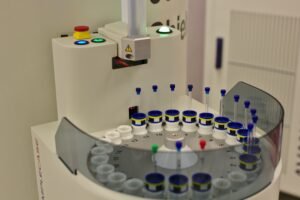What is tyrosine good for?
Tyrosine is best known as a performance enhancer.
When taken as a dietary supplement, it can be used by the brain to produce neurotransmitters.
This naturally results in sharper mental focus, better memory, enhanced multitasking ability, and improved mood.
In a nutshell, tyrosine augments short-term memory and motivation; what is commonly referred to as ‘working memory’.
What is working memory, and why should we care about it?
It’s basically the fluid, flexible part of your thought processes that allows you to get things done.
Creativity and ‘flow states’ are also easier to establish when supplementing with tyrosine, even under stress.
These particular characteristics have proven tyrosine to be very effective at helping with ADHD and depression.
So how does one nootropic manage to accomplish all of these wonderful things?
Let’s find out!
What is L-Tyrosine? – How does it work?
Tyrosine is an amino acid that’s commonly found in foods like beef, pork, fish, chicken, tofu, milk, cheese, beans, seeds, nuts, and whole grains.
However, unlike most other amino acids, L-Tyrosine is not used by the body to build muscle; its’ true value is as a neurotransmitter precursor.
L-Tyrosine is used to produce 3 essential neurotransmitters: dopamine, epinephrine, and norepinephrine.
These ‘3 Amigos’ are collectively grouped into the ‘catecholamine’ group of neurotransmitters.
The catecholamines are essential for regulating mood, memory, creativity, and attention control.
When a person is under stress, hormones like Cortisol get released into their system, and can go on a rampage that destroys all 3 of the catecholamines.
The end result can be depression, difficulty remembering things, disrupted concentration, and an inability to shift focus from one task to another.
What is NALT? – What does it do?
NALT stands for N-Acetyl L-Tyrosine.
It’s a form of L-Tyrosine that’s readily absorbed by the body, and can easily pass through the blood brain barrier.
It’s included in many premium nootropic stacks as a key ingredient for performance enhancement, because of it’s high absorption rate and effectiveness.
So how does NALT protect us from depression, and help maintain brain function under stress?
Simple.
By increasing levels of all 3 catecholamine neurotransmitters.
This all sounds very simple, but what are the mechanisms at play?
In a practical sense, what advantages does taking NALT as a supplement offer us?
NALT Benefits – What Do You Notice Right Away?
Optimized neurotransmitter levels roughly translate into these benefits:
- Better Working Memory
- Attention Control – improved ability to multitask; helps reduce symptoms of ADHD
- Antidepressant Qualities
The ability to stay mentally sharp, faster recall, shift attention from one task to another, and to stay motivated longer are all common experiences.
Supplementing with NALT also elevates mood, and makes people feel on top of their game.
What’s also impressive is that it can provide all these benefits even while individuals are sleep-deprived.
In practical terms, what this means is that NALT is a good item to have in your nootropics stack for situations like:
- High Pressure Work Scenarios
- Studying for Exams
- Recovery from Trauma
- Relationship Issues
- Extreme Sports
These situations can apply to just about any of us, so NALT is certainly a very useful nootropic.
That being said, NALT can also help with depression and ADHD symptoms.
Let’s take a look at how it can help people with these debilitating issues…
NALT for Depression – How effective is it?
The 3 neurotransmitters most closely associated with depression are dopamine, norepinephrine, and serotonin.
NALT increases levels of dopamine, norepinephrine, and epinephrine.
It’s not an exact match, but I guess 2 out of 3 isn’t bad.
Nonetheless, NALT has been proven to protect both animal and human test subjects from depression due to various stressors.
Generally speaking though, some studies have had results that were inconclusive.
In my opinion, NALT is not a suitable replacement for traditional therapy when it comes to depression.
I think that anyone interested in using nootropics as an alternative to traditional drug therapy should look at finding a good nootropic stack that already has NALT in it.
They should also work with their therapist or doctor, and ask them to monitor their progress.
NALT for ADHD – How Helpful is it?
Fortunately, NALT has shown better results when used to treat symptoms of ADHD or ADD.
In one clinical study, participants received L-Tyrosine over a period of 8-10 weeks, and 77% of them showed significant improvement in their symptoms.
The researchers concluded that, “The efficacy of this novel protocol appears superior to some ADHD prescription drugs…”.
Pretty impressive!
Further studies later found that when ADHD patients took either Ritalin or Adderall, and supplemented with Tyrosine at the same time, the effects of the stimulants lasted much longer than when taken on their own.
The test subjects also noted that tyrosine supplementation prevented the crash they often experienced once the effects of the stimulants wore off.
Additional studies are being conducted to find out if herbal nootropics, vitamins, and other amino acid compounds can also be used safely for ADHD.
Alternative Treatments for ADHD – Where is Today’s Research?
In fact, some of these studies are trying to determine if natural nootropics like Bacopa Monnieri could be used for children with ADHD.
This is all very exciting for me, because my daughter has ADD, and the standard psychotropic stimulants used today often don’t work.
30% of the kids that take them see no improvement, and the symptoms can include nausea, insomnia, and weight loss.
I would never put my daughter on these kinds of meds personally, but Bacopa Monnieri? Sure, I might do that instead…
So we’ve established that Tyrosine enhances performance, can help prevent depression, and is good for ADHD symptoms.
The next question to answer is, how do we use it safely?
NALT Dosage – Recommendations for Best Results
NALT and L-Tyrosine are both available as a powder, tablets, or capsules.
There’s a difference in dosage recommendations for straight L-Tyrosine, as opposed to NALT.
A certain amount of any L-Tyrosine you take in will be flushed out of the body without being used, but NALT is absorbed more completely.
The recommended daily intake for L-Tyrosine is 500mg to 1,000mg/day, taken at least 30 minutes before meals, 2 or 3 times per day.
The recommended daily dosage for NALT ranges from 150 mg to 350 mg/day, depending on your individual body chemistry.
People can also develop a tolerance to both L-Tyrosine or NALT with regular use, so you might have to increase your intake to get the same benefits.
NALT can also cross the blood-brain barrier, so it’s much more useful as a nootropic.
These are the reasons NALT is the preferred form of tyrosine to take in supplements, especially for cognitive enhancement.
That being said, is NALT safe? Is your head going to explode if you take too much?
L-Tyrosine Side Effects – How Severe are they?
Although tyrosine sounds like a pharmaceutical grade chemical compound, it’s actually just a simple amino acid.
L-Tyrosine and NALT are both non-toxic, and are very well tolerated.
The vast majority of people that take tyrosine supplements do not experience side effects at all.
However, there are a few cautions I should mention to you, just in case.
Some people can experience some mild nausea, and if they already suffer from migraines, they might start having more headaches more often.
A few studies have shown that tyrosine can increase thyroid hormone levels slightly, and lower blood pressure.
NALT and L-Tyrosine should not be taken together with MAO inhibitors. MAO inhibitors basically block the reabsorption of neurotransmitters in order to prevent depression.
Anybody that has special concerns about their health, especially in the areas I just mentioned, should talk to their doctor first before taking any tyrosine supplements.
Tyrosine Supplements – Where to Find Good Products
If you want to find a good tyrosine supplement for cognitive enhancement, I recommend you find a product with NALT.
You should also look for a manufacturer that’s ‘cGMP Certified’, which stands for “Current Good Manufacturing Practices”.
This means the producer has to follow strict guidelines from the FDA, and their supplements get checked out for effectiveness, purity, and safety by a neutral third party.
It’s not a total guarantee, but it is the highest standard available for food production and supplements in North America.
I can also recommend getting your NALT from DoubleWood; they offer good value and quality on solo nootropics.
I always tell people to go to their website for custom stacking.
There’s a banner ad for DoubleWood on the home page of this site; just click on it and it’ll take you to their online store.
All right, we’re finally at the end of the road. Let’s wrap things up, shall we?
Benefits of Tyrosine – Final Recommendations
So let’s recap. What is tyrosine good for? What can it do for us?
L-Tyrosine is an amino acid precursor to the catecholamine group of neurotransmitters dopamine, norepinephrine, and epinephrine.
Tyrosine is naturally occurring in foods, but most people do not receive enough of it in their diet to produce adequate amounts of catecholamines.
Supplementing with tyrosine can therefore result in several benefits related to cognitive function.
NALT, or N-Acetyl L-Tyrosine, is more easily absorbed than L-Tyrosine, and can cross the blood-brain barrier.
NALT is therefore preferred over L-Tyrosine as a nootropic supplement.
In my opinion, tyrosine is the best nootropic for working memory, but it has other advantages.
Stress and sleep deprivation can deplete catecholamine levels in the brain, and tyrosine counteracts these effects extremely well.
Tyrosine has been proven to be helpful with depression, and relieving symptoms of ADD/ADHD.
So who can benefit the most from using NALT as a nootropic?
I’d say anyone dealing with a lot of stress, chronic fatigue, possible depression, or ADHD should look at using NALT to their advantage.
All right! That’s a good rundown of what tyrosine is good for as an individual nootropic.
Thanks for reading!
In my next article, I’ll be talking about the health benefits of oat straw extract!
Until next time,
Michael
P.S. – If you have any questions, just post a comment below, and I’ll get right back to you!
Cheers!









Hey Michael,
What an interesting article.
I am 45 years old and I went back to university when I was 38. I found when I turned 40 my short term memory started to struggle.
I was studying drama and had to learn lines of whole plays. This was a major issue. I would forget little details, or where I had put things.
Funnily enough a few years before I had suffered with depression, and I always wondered whether that had a part to play. I am happy to say, my memory now is much better, I increased my water intake and made lifestyle changes. (reduced stress etc)
Your article has opened a few more avenues for me to investigate further though.
Thanks
Hi Sarah,
Thanks for reading my article. I really appreciate you sharing your thoughts.
Feel free to share my post with friends, and if you have any questions, just give me a holler!
Michael
Hi Michael,
Thank you for sharing this article.
I could definitely benefit from a boost in working memory.
As with all supplements, my worry is always about becoming dependent on them.
You did mention that our body will naturally build up a tolerance to NALT over time. Does that mean that if I stopped taking the supplements, it would make my working memory even worse than before I started?
Hi Steve,
Thanks for reading my article on working memory.
L-Tyrosine is an amino acid that is naturally occuring in a lot of foods.
Tyrosine is a building block for neurotransmitters, so your body takes it and synthesizes Dopamine, Epinephrine, and Norepinephrine. This has all kinds of benefits.
It’s not addictive, and if you do build up a bit of tolerance to L-Tyrosine, you may have to raise your dosage slightly until you feel you are at your best level of optimization. The difference should be minor, until you plateau.
You will not experience a drop in IQ once you stop taking your Tyrosine supplement. You might experience some brain fog and feel sluggish, but you would adjust after a while.
I hope that answers your questions. If you thing of any others later on, just leave another comment.
Michael
Hello Michael,
Working memory is fine when it works, but can be a challenge for folks when not operating at full capacity.
On the other hand, there are a few things even short term that I would rather forget.
In any event, I appreciate anything that enhances focus and the ability to stay in the moment with full concentration.
I have done some research into nootropics as part of my work in mental health, but I am not familiar with NALT.
Being able to assist with depression and ADHD is tremendous. Over the years in my work, I have found that, in my opinion, too many psychiatrists prescribe psychotropics indiscriminately. Lots of good benefits from this nootropic.
Thanks for explaining this so thoroughly.
I will review your info on Bacopa Monnieri as well. I am going to bookmark your website, and I look forward to future articles.
Much appreciated.
Hi Joseph,
Thanks for reading my article on NALT, or N-Acetyl L-Tyrosine.
It’s not exactly light reading, is it?
I consider it my mission to provide people with alternatives to traditional medicines, and welcome them into the nootropics community.
Last year I found out that I have ADD, and so does my daughter. I tried psychotropic drugs, and I hated taking them.
Luckily, I am low enough on the ADHD spectrum to have the option of using nootropics to manage my ADD instead.
Just out of curiosity, are you a psychiatrist yourself? Do you think we will ever see the day when nootropics are integrated into people’s treatment plans on a regular basis?
I’d like to see that happen. For my daughters’ sake.
Thanks once again for reading, and if you have any questions, please let me know.
Michael